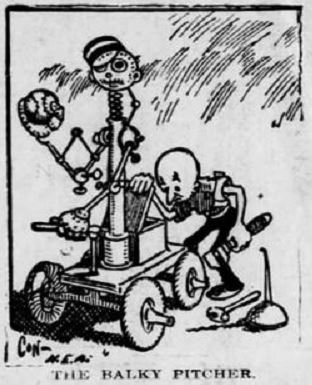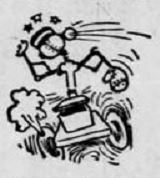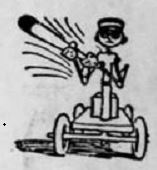London Wins Great Game
The Pittsburgh Pirates owned the National League at the start of the 20th century. They won the pennants in 1901, 1902, and 1903 by a total of 41½ games. Then came the disastrous, injury-filled season of 1904 when the club fell to fourth behind the Giants, Cubs, and Reds. John McGraw’s New York team ran away from the rest of the league and refused to play the upstart American League after the season. Pittsburghers undoubtedly took that personally, since the Boston Americans — the same Boston club that upset the Pirates in the one and only 1903 World Series — again won the AL pennant. “Wait until next year” was already the slogan of frustrated fans everywhere.
Baseball fans in Pittsburgh saw good reason to hope that better baseball lay in the offing. So did the press. On January 1, 1905 they looked ahead. Way ahead. The headline in the Pittsburg Press read “London Wins Great Game.”
Pittsburg? London? The first is easy to explain: the city didn’t officially add the “h” back to its name until 1911 and the Press newspaper held out until 1941. London couldn’t be right – unless you saw the page banner, “ONE HUNDRED YEARS HENCE/What the Press May Print in 2005.” The full page New Year’s Day spoof predicted impossibilities like condensed milk straight from the cow, women wearing trousers, and international baseball.
Chicago, January 1, 2005 – It is estimated that 100,000 spectators witnessed the second game of the series between the Chicago and London teams of the International Baseball League. London won, 2 to 0.
The victory was due chiefly to the superiority of the new pitching device invented by T. A. Edisonon, the greatest inventive genius of the century. The Chicago automatoms could not decipher the riddle propelled by the machine.
Automatoms. Though newspapers usually spelled the word “automaton,” either variant in modern terms meant robot. “M.E.A.”s artistry pictured them for readers. The players had faces painted on oversized baseballs for heads, pantographic arms, and slim cylindrical bodies on top of four-wheeled bases. Inventor extraordinaire Thomas Alva Edison, then 57, reigned as the most famous man in America; why his namesake invented for London is unexplained. (As is how the writer refrained from naming him the more punning Edisonson.)
Back in that first age of technological miracles, the future always promised to be bigger and better. No stadium in the world could seat 100,000 people in 1905. Exposition Park in Pittsburg filled to overflowing for the second 1903 World Series game with 12,000 in attendance. Chicago’s West Side Park wasn’t much larger. That future would come true, though, at least once. An exhibition game in 2008 between the Dodgers and Red Sox for the 50th anniversary of major league baseball arriving in Los Angeles drew a crowd of 115,300 to the Coliseum.
L. Lahoay, who manages the Chicago team, was unable to make his pitcher work. The auto seems to be in the sulks, and although the other autos fielded well, their inability to solve the London delivery caused their downfall.
When the rival managers wound up their respective automatoms at the beginning of the game, the bookmakers were offering odds on the visitors, pinning their faith on the Edisonon invention. They evidently had an inside tip on the effectiveness of the new pitching auto.
The Londoners batted hard and bunched their wallops when hits were worth money. The fielding of A-Z, which played short field for the Chicagos, was phenomenal. With almost human intelligence the auto seemed to be in the right place at the right time, and not a ball hit between second and third base went past it.
Pitching dominated baseball in 1905. A 1925 prediction would certainly talk of robots clobbering the balls for miles out of the park. Here the hits are few and infield fielding carries the day. (The Press, always eccentric in word choice, preferred “short field” over the much more common “short stop,” “short-stop,” or “shortstop.”) The writer anticipated the cute number and letter designations given robots like Star Wars’ R2D2 and C3PO by 70 years.
The Londoners bunched their hits in the second inning and made their runs. R-Q, the first batter, connected with one of the Chicago auto’s fast ones and reach reached first before M-B in center field could head it off. L-D which followed sacrificed. C-D doubled to left and both machines scored a moment later when K-V ripped off a hard three-bagger over M-B’s upper mechanism.
This ended the scoring, the next twelve batters being retired by the wonderful fielding ability displayed by A-Z.
A single, a double, and a triple. No talk at all about Chicago hitting. The National League didn’t see a single no-hitter in the 1904 season; it’s hard to imagine the writer not mentioning one. We’re missing a lot of the game.
The teams will be shipped from Chicago Wednesday night via the Chicago and New York Pneumatic Tube Transit Co., beginning a series of three games in the English metropolis Thursday afternoon.
Elon Musk’s recent Hyperloop proposal is just a modern version of the pneumatic tube, a device using compressed air to send cylinders to recipients. Many bank drive-throughs still use them. Back in 1905 cities often had hundreds of miles of tubes that sent mail and small packages throughout downtowns. The bigger, better future would use them for intercity traffic, a smart move in an era that lacked good paved highways and speedy cars and trucks.
In view of the interest now taken in what was once the national game of this country, when played by human beings instead of electrically controlled automatoms, it is probable that this year will be extremely prosperous. The cost of maintaining the automatoms is not excessive, and although L. Lahoay and the other managers are paid munificent salaries, the backers of the league are expected to clear several million dollars.
This is juicy contemporary satire, but maybe even more so for the modern reader. The American League formed in 1901 with a bang, energized by stealing players away from the National League, whose cap of $2,400 for a season looked tiny against the $4,000 the AL offered. Napoléon “Nap” Lajoie, also known as “Larry,” gave the new league instant respectability when he became the first superstar to accept the pile of cash. Cleveland announced after the 1904 season that he would become their player-manager, making him a good candidate for the scheming “L. Lahoay” of the article. Fred Clarke, Pittsburgh’s player-manager, made out even better in 1905, signing a contract for the second-highest managerial salary in baseball, probably $7,500.
Salaries would double and triple over the next decade, as attendance soared. Just as today, the value of franchises soared as the game increased in popularity and the money for good franchises always flowed to the top. As the anonymous writer understood, the leagues that seemed near collapse a few years earlier now were worth millions. Automatoms may have been expensive, but they didn’t strike, demand salary hikes, or threaten to jump leagues. Robots are always the future. Wait until next year.
Steve Carper writes for Digest Enthusiast; his story “Pity the Poor Dybbuk” appeared in Black Gate 2. His website is flyingcarsandfoodpills.com. His last article for us was Carl Burgos and Air-Sub “DX”.



